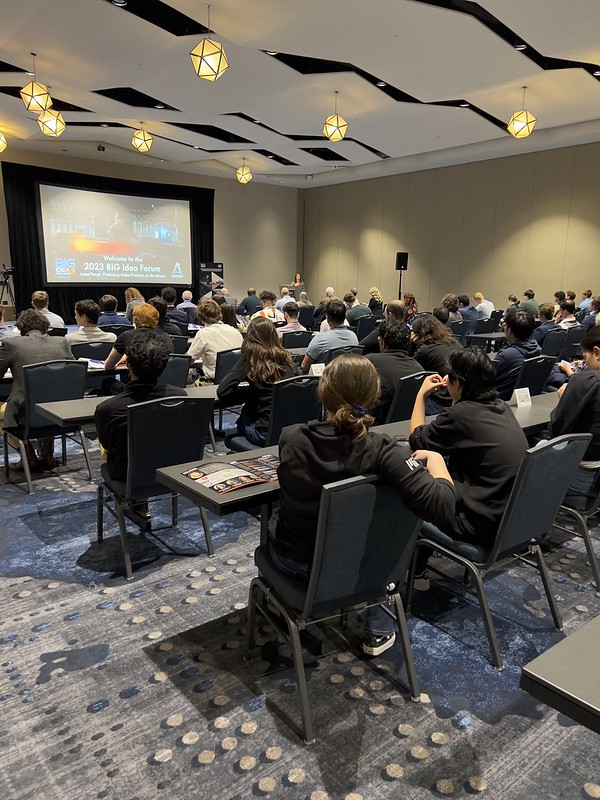Through Artemis, NASA plans to conduct long-duration human and robotic missions on the lunar surface in preparation for future crewed exploration of Mars. Expanding exploration capabilities requires a robust lunar infrastructure, including practical and cost-effective ways to construct a lunar base. One method is employing in-situ resource utilization (ISRU) – or the ability to use naturally occurring resources – to produce consumables and build structures in the future, which will make explorers more Earth-independent.
An ISRU process that NASA wants to learn more about is forging metals from lunar minerals to create structures and tools in the future. Through its 2023 Breakthrough, Innovative and Game-Changing (BIG) Idea Lunar Forge Challenge, NASA sought innovative concepts from university students to design an ISRU metal production pipeline on the Moon. The year-and-a-half-long challenge, funded by NASA’s Space Technology Mission Directorate (STMD) and Office of STEM Engagement, supports NASA’s Lunar Surface Innovation Initiative in developing new approaches and novel technologies to pave the way for successful exploration on the surface of the Moon.
Finalist teams presented their research, designs, prototypes, and testing results to a panel of NASA and industry judges at a culminating forum on Nov. 16, in Cleveland, Ohio.
The University of Utah team, partnering with Powder Metallurgy Research Laboratory, earned the Artemis Award, which represents top honors in the 2023 BIG Idea Challenge. Their lunar forge project, Production of Steel from Lunar Regolith through Carbonyl Iron Refining (CIR), represents a promising avenue to extract iron from reduced lunar regolith and refine it into a high purity powder product in a two-stage process. The Artemis Award is given to the team whose concept has the best potential to contribute to and be integrated into an Artemis mission.
Collin Andersen, Team Lead
University of Utah and Powder Metallurgy Research Laboratory
Teams could select to address technologies needed along any point in the lunar metal production pipeline, including, but not limited to:
- Metal refining
- Forming materials for additive manufacturing
- Testing and qualifying 3D printed infrastructure for use on the Moon
In January, teams submitted proposal packages, from which seven finalists were selected in March 2023 for funding of up to $180,000, totaling nearly $1.1 million across all teams. The finalists then worked for nine months designing, developing, and demonstrating their concepts. The 2023 BIG Idea program concluded at its annual forum, where teams presented their results and answered questions from judges, followed by an interactive poster session. Experts from NASA and other aerospace companies evaluated the student concepts based on technical innovation, credibility, management, and teams’ verification testing. In addition to the presentation, the teams provided a technical paper and technical poster detailing their proposed metal production pipeline.

Niki werkheiser
Director of technology maturation within STMD
In addition to the top spot, several teams were recognized in other categories, including:
Edison Award: Missouri University of Science & Technology
Path-to-Flight Award: University of North Texas with Advanced Materials & Manufacturing Processes Institute at UNT; Enabled Engineering
Systems Engineering: Northwestern University with Wearifi Inc.; Rexnord Aerospace; QuesTek Innovations LLC; and ANSYS, Inc.
Best Verification Demonstration: Colorado School of Mines
BIG Picture Award: Massachusetts Institute of Technology with Honeybee Robotics
Innovation Award: Pennsylvania State University with RFHIC & Jacobs Space Exploration Group
The 2023 BIG Idea Challenge is sponsored by NASA through a collaboration between STMD’s Game Changing Development program and the Office of STEM Engagement’s Space Grant project. The Challenge is managed by a partnership between the National Institute of Aerospace and the Johns Hopkins Applied Physics Laboratory (APL).
NASA sponsors the 2023 BIG Idea Challenge through its Game Changing Development program and the Office of STEM Engagement’s Space Grant project. The National Institute of Aerospace and the Johns Hopkins Applied Physics Laboratory (APL) in Laurel, Maryland managed the challenge for NASA.
Team presentations, technical papers, and digital posters are available on the BIG Idea website.
For full competition details, visit:
